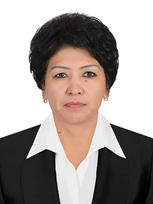TEACHING ENGLISH FOR SPECIFIC PURPOSES
Keywords:
academic, professional, vocational contexts, skill, task-based learning, real materialsAbstract
In this article, the ideas and methods of Teaching English for Specific Purposes (ESP) are examined. With a focus on task-based learning and the use of real materials, it examines efficient approaches for delivering ESP training and emphasizes the significance of needs analysis in curriculum design. The study also takes into account the opportunities and difficulties brought about by the changing demands of students in many academic and professional settings.
References
O’ Sullivan, B. (2012). Assessing speaking. INC. Coombe, P. Davidson, B. O’Sullivan, &S. Stoynoff (Eds.), The Cambridge guide to second language assessment (pp. 234-246). Cambridge University Press.
O’ Sullivan, B. (2012). Assessing speaking. INC. Coombe, P. Davidson, B. O’Sullivan, &S. Stoynoff (Eds.), The Cambridge guide to second language assessment (pp. 234-246). Cambridge University Press.
Rilling S. (2018) Audio-Lingual Method. The TESOL Encyclopedia of English Language Teaching. Edited by John I. Liontas. John Wiley & Sons, Inc.
Wheeler, S., Yeomans, P., & Wheeler, D. (2008). The good, the bad and the wiki: Evaluating student-generated content for collaborative learning. British Journal of Educational Technology, 39(6), 987-995. https://doi.org/10.1111/j.1467-8535.2007.00793.x
Liontas, J. I. (2020). Gaming in the classroom and beyond: Breaking down the barriers to gamified language learning. IN J. I. Liontas (ED.), The TESOL encyclopedia of English language teaching (pp. 1-7). Wiley. https://doi.org/10.1002/978118784235.eelt0997
McGrath, I. (2016). Materials evaluation and design for language teaching. Edinburgh University Press
Viana, É., Serra, N., Fontes, A., Borges, F., & Cruz, R. (2018). Introduction. Journal of Research in Education and Training, 2(1), 12-18.
Nasretdinova, M. N. (2023). Figure Of Speech In Fiction And Studying The Concept Of Ellipsis. PERFECT EDUCATION FAIRY, 1(1), 23-35.
Abdujabarova, Kamola Husniddin Qizi. "Analysis of Speaking Methods in Teaching Foreign Languages." Journal of Higher Education and Academic Advancement 1.1 (2024): 219-223.
Fuzaylova, N. A. (2024). ANALYSIS OF THE EXPRESSION AND SPECIFIC CHARACTERISTICS OF NEOLOGISMS IN TRANSLATION. Ta'lim innovatsiyasi va integratsiyasi, 21(2), 175-180.
Fuzaylova, N. A. (2024). USE TECHNOLOGY IN MATERIAL DESIGN, LESSON PROCEDURES, AND ASSESSMENT. INNOVATIVE DEVELOPMENTS AND RESEARCH IN EDUCATION, 3(33), 141-143.
Fuzaylova N. A. Genre in Academic Prose: What Makes Academic Prose Different from Other Varieties //Spanish Journal of Innovation and Integrity. – 2023. – Т. 25. – С. 34-37.
Kuryozova Gulshan Akmal qizi. (2023). Translanguaging and ELT (English language teaching). International Scientific and Current Research Conferences, 1(1), 404–408.
Abdullayeva, M. (2022). The Appearance Of The Term “Education Dictionary” In World Linguistics Is Analyzed. Oriental renaissance: Innovative, educational, natural and social sciences, 2(Special Issue 28-2), 48-52.
Abdullayeva, M. R. (2018). National color in artistic translation (Uzbek language). Moscow Polytechnic University in South-Western State University (Russia).“Problems and perspective development of Russia: youth review in the future, 2, 19-23.
Raxmonkulovna, A. M., Ilxomqizi, S. S., & Xaitbayevna, N. M. (2020). Principles of understanding a positive language in translation (in act of the agata Kristi works). ACADEMICIA: An International Multidisciplinary Research Journal, 10(4), 156-158.





